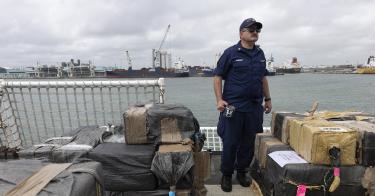In 2023, fatal overdoses from drugs peaked at more than 112,000 deaths, the highest in U.S. history. Most attention is focused on the border with Mexico, but massive amounts of narcotics continue to move through the Caribbean to the coasts of Florida. The best way to keep the drugs killing Americans out of Florida is to stop them well before they reach our shores by working with partners in the region to block the flow much closer to the source. In other words, reducing the number of narcotics ending up in Miami by making sure they don’t get there in the first place.
The Biden administration unveiled its counternarcotics strategy for the Caribbean almost two years ago. The strategy accurately identifies drug smuggling via the Caribbean as one of the primary vectors for illicit drugs flowing into the U.S., and it also identifies some commonsense countermeasures, like counternarcotics patrols, intelligence sharing and strengthening port security. So far, however, the administration has struggled to execute this plan, partially because they have underestimated the importance of incentivizing and enabling of our regional partners.
The Coast Guard is our most effective asset for port security in the Caribbean, and international cooperation is the biggest force multiplier available to them. Working with other nations’ militaries and law enforcement agencies, the Coast Guard can stop drugs long before they reach the coast of Florida.
>>> Designating Mexican Drug Trafficking Organizations as Foreign Terrorist Organizations
Typically, these drugs come from South America and are smuggled to the United States through commercial shipping routes and ports across the Caribbean. In some cases, drugs are moved because of lax security protocols or corrupt officials, but often the issue is a lack of capacity and inadequate training. By expanding its Foreign Port Security program, the Coast Guard can help our Caribbean partners do a better job of securing their facilities, and increase the percentage of drugs seized at foreign ports before reaching the U.S.
In other parts of the hemisphere, such as Mexico, U.S. counternarcotics cooperation is severely limited by corruption and political hostilities. However, the Caribbean is a generally friendly sea in geopolitical terms, and most local governments are eager to work with the United States to promote regional security. Indeed, the United States already has eager partners in countries like the Dominican Republic, who have made a concerted effort to bolster their counternarcotics operations. The U.S. also works closely with The Netherlands in joint counternarcotics operations out of Aruba and Curaçao.
A little can go a long way in the Caribbean, and small investments in regional security can have a dramatic effect. Low-cost equipment donations to Caribbean partners can have a dramatic impact on counternarcotics capabilities for U.S. partners, while sending an important message about U.S. commitments to regional security.
The Dominican Republic, for example, requires better radar and tactical communications technologies to identify and respond to drug shipments more effectively. Jamaica would benefit from training craft to ensure its forces are adequately trained and prepared to face well-funded narcotics traffickers. Likewise, small numbers of U.S. military personnel training with military and police forces in countries like Jamaica or Trinidad and Tobago would send a signal to local partners that the U.S. is both interested in their well-being and ready to work with them to confront what is undoubtedly the biggest security issue in the region.
>>> From Worst to Worster: Adding Xylazine to Fentanyl
The U.S. can also bolster investments in its own counternarcotics capabilities. A persistent complaint from U.S. Southern Command is that a lack of resources force it to watch as illegal drug shipments enter the U.S. This is an unacceptable reality that must change. Ensuring that the U.S. is dedicating adequate resources to confront the growing threat of illicit narcotics trafficking should be a top priority for the White House. To that end, the U.S. territory of Puerto Rico could be made into a counternarcotics coordination hub in the Caribbean, with appropriate expansions to the Coast Guard’s presence and fleet.
In the past, partnerships between U.S. Southern Command and Colombia were instrumental in keep Florida safe and bringing the fight to the cartels. It is time for the U.S. to apply that same political will and commitment to the broader Caribbean and truly confront the challenge of deadly narcotics trafficking. Prioritizing Caribbean partners for port security programs and training exercises will give them the tools and incentives to make a bigger impact on the drug trade. Communities in Florida, and across the country, will reap those benefits for years to come.
This piece originally appeared in the Tampa Bay Times





